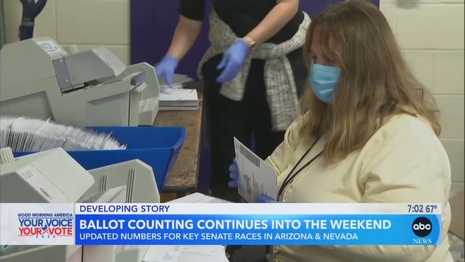 Are you among the increasing number of people wondering why Maricopa County, Arizona can't count their votes on time? As of this writing, three days after the midterm elections, there are still over 400,000 ballots yet to be counted in Maricopa County. In fact, most of the votes might not even be counted until after the weekend according to KTAR-News radio in Phoenix, "Maricopa County now says most ballots won’t be counted by Friday: ‘The goalposts have changed.’"
Are you among the increasing number of people wondering why Maricopa County, Arizona can't count their votes on time? As of this writing, three days after the midterm elections, there are still over 400,000 ballots yet to be counted in Maricopa County. In fact, most of the votes might not even be counted until after the weekend according to KTAR-News radio in Phoenix, "Maricopa County now says most ballots won’t be counted by Friday: ‘The goalposts have changed.’"
If you dare to criticize the apparent incompetence of the pathetically delayed ballot counting, you could be guilty of "disinformation" according to a Washington Post editorial published on Wednesday, "Here’s the sad truth about election-related disinformation."
The scant number of irregularities the midterms did produce have already spawned conspiracy theories, and with the votes still being counted in close races across the country, experts in disinformation are on alert. Researchers say the false narratives that have gained the most traction involve Arizona. When tabulators in Maricopa County struggled to read ballots on which the ink was printed too lightly, conservative influencers portrayed the glitch — and the solutions that rectified it — as attempts to leave votes uncounted. Similar issues — and suspicion — arose in Mercer County, N.J., and Luzerne County, Pa.
...But unfortunately — and predictably — others, including candidates, political operatives and right-wing media commentators, have spread and amplified false claims of ballot fraud. Notable among them was Republican Arizona gubernatorial nominee Kari Lake, who compared the yet-to-be-called election in her state to a “groundhog day” of Mr. Trump’s 2020 loss — which she still denies was legitimate.
Of course, the Washington Post editorial board is upset at what they see as a loosening of censorship:
Platforms have made impressive progress in taking down networks of malign state actors, but they’ve proved less adept at coming up with a coherent, transparent answer to domestic misbehavior that does not run afoul of free speech. Meanwhile, those most likely to traffic in falsehoods are dispersing to fringe services such as Gab, Parler and Gettr, which show little concern with fighting fraudsters. Large-scale layoffs at Meta and at Twitter after Elon Musk’s takeover could threaten the election protection infrastructure these companies have built up — unless they take care to prioritize this crucial commitment.
How bizarre is it that we now live in a world where the editorial board of a major American newspaper is calling for stricter censorship?




